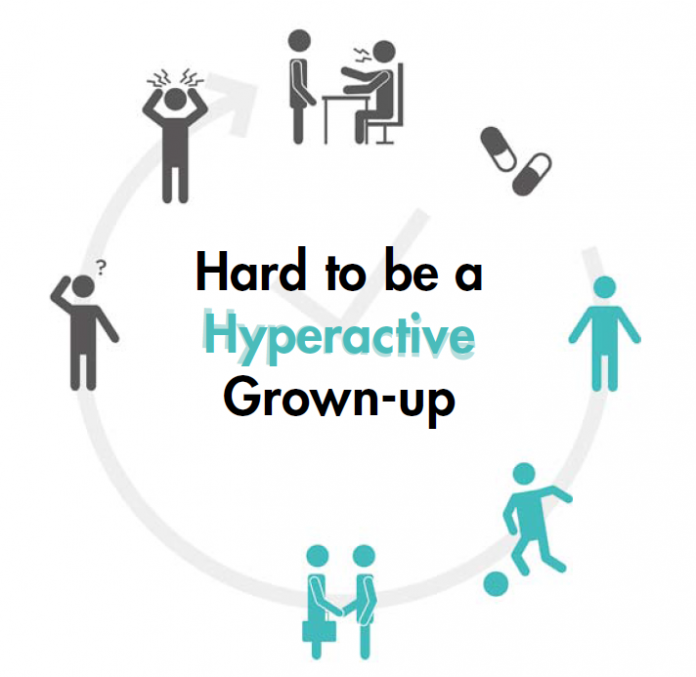ADHD is now well-recognised among children but few know it affects adults as well
by Fiona Chan & Ryan Li
Under the dim yellowish light, a woman is preparing the bar to welcome its customers later today. She checks there are sufficient bottles of wine, then walks over to another side of the bar to check the roster. From time to time, she takes out her phone and speaks into it, making voice notes. Grace Ma Lai -wah, who owns Club 71 in Central, was diagnosed with attention deficit hyperactivity disorder (ADHD) just over a decade ago. It means the 63-year-old tends to forget things and relies on her smartphone for reminders.
ADHD was relatively unknown in Hong Kong in the past. It is a brain disorder characterised by ongoing symptoms of inattention, hyperactivity and impulsivity that interfere with daily life. People with ADHD tend to have difficulties organising tasks, remembering things and maintaining focus on tasks that require sustained mental effort, especially those that are monotonous and repetitive. However, they can be hyper-focused on the things they find particularly interesting.
These days, more people are aware of ADHD, but most perceive it as a childhood disorder. ADHD in adults was not recognised until relatively recently. In 2013, The Diagnostic and Statistical Manual of Mental Disorders – Fifth Edition (DSM-5), published by the American Psychiatric Association, suggested society should also be concerned about ADHD in adults.
DSM-5 says ADHD usually begins in childhood, with symptoms first appearing before the age of 12. This is a revision from the earlier diagnostic criteria that symptoms should be present before the age of seven. The symptoms can continue into adulthood, but society’s previous lack of awareness of ADHD and current ignorance of adult ADHD means many adults who have it do not know about their condition.
Many will have gone through life not understanding why they find it so hard to be attentive especially when they are busy. They are likely to be frustrated or even depressed because of continued underachievement.
Ma, who suffers from attention deficiency and struggled with frustrating failures, she says she was glad to be finally diagnosed, even though she was already in her 50s by then. The diagnosis seemed to explain her meandering life path.

At school, she had always performed excellently in most tests but failed in examinations. She failed at three consecutive attempts to pass her nursing qualification exams although she once came first place in nursing school.
The failures dragged her into depression. “ADHD” Things were no easier when she first started running a bar in the 1990s.
“I made mistakes at every step and at all times,” she says, from forgetting to write down customers’ orders to collecting payment.
To a certain degree, being her own boss made things easier for Ma. Not so for an employee who had ADHD. Ma says she hired the youngster after she had already been diagnosed and understood the disorder.
She tried her best to help the employee and did not scold him when he was late for his shift or even failed to show up. But the other staff were not so sympathetic.
Support and understanding from family and friends is important for those with ADHD. Ma’s boyfriend reminds her to take her medication every day. She also seeks help from her friend, Dr Eunice Wong Yuk-chun, who first spotted that Ma had ADHD.
Wong is a medical doctor, the founder of the ADHD Foundation and was herself diagnosed with ADHD in 2005. Wong recalls how she used to keep stopping when she was replying to emails, continually minimising the windows.
“At the end of the day, I minimise all without sending them out because I am indecisive.”
Wong says this is a typical experience for someone with ADHD and can lead to under-achievement.
“The under-achievement happens automatically, but you scratch your head unable to figure out why,” says Wong, “Why things cannot go smooth despite my diligence?”
After she was diagnosed Wong started medication but she often forgot to take her medicine. The assistant at her clinic, who has helped her for years, often reminds her to do so and is one of her important social supports.
Apart from inattention and forgetfulness, Wong experiences another aspect of ADHD – hyper-focus. Sometimes, she incorporates the interests of her hyper-focus into her interactions with her patients. At one time, she was interested in palmistry and studied her patients’ palms for several weeks. Another time, she was so interested in the self-help book The Truth About Love that she made a PowerPoint of over 200 slides about it and shared it with her patients.
“Some patients think my symptoms are even more serious than theirs,” Wong jokes.
ADHD can be hereditary and Wong’s son and daughter both have it. But with treatment, they have been successful in their academic life and both went to university. This highlights the importance of raising awareness of ADHD so people can understand their condition and get treatment.
Wong has seen many patients who suffer from under-achievement and end up addicted to drugs, to gambling and to romantic relationships.
“If an ADHD patient does not know he or she has ADHD, a lot of tragedies will happen,” she says.







































